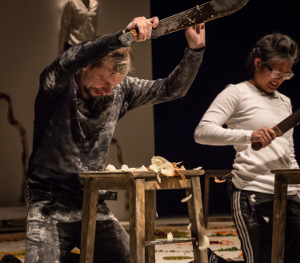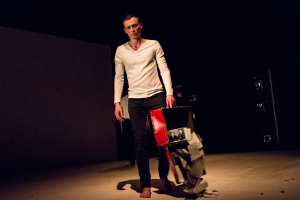
| Two views of "Trash Cuisine" by Belarus Free Theatre Beate
Hein Bennett Consumption
and Consummation "Trash Cuisine" Based on true stories
As human violence continues to bedevil the world and wracks our collective conscience, theatre has continued to make it the central subject of concern for the past 2,500 years. Violence is deeply embedded in the behavior of our species; whether it is individually committed, state sponsored, industrially inflicted, human-on-human, human-on-animal, human-on-environment, large scale or selective, we seem incapable of rooting it out of our genetic organism and social systems. No society, no continent, no group, no religion is free from this curse. Violence and its repercussions is the subject of "Trash Cuisine" played with exquisite artistry by the ensemble of the Belarus Free Theatre which has felt the political repercussions on its own body through censorship and imprisonment in its native Belarus, a state that aspires to belong to the European cultural archipelago but is run by an authoritarian dictatorship. It is the only country in Europe that has the death penalty and will not even return the body of the executed to the family for burial. It is this fact of home-based state violence that inspired the co-directors Nicolai Khalezin and Natalia Kaliada to found the Belarus Free Theatre in March 2005. The opportunity to perform in New York came with The Public Theatre "Under the Radar" Festival in 2011 after which they found out that they would be imprisoned if they returned to Belarus. They had to seek political asylum and found it in the UK where they are registered as a company, since 2012 as an associate of the Young Vic Theatre. Since then BFT continues as a "two-headed beast, in one capacity doing plays in the UK with British, Belarusian, and international actors, and in the other, continuing the work of their permanent ensemble in Minsk where plays are continually developed, rehearsed, and performed in apartments and secret locations and where students continue to train in the theatre laboratory, Fortinbras. Shows are directed on Skype from London with actors working underground in Belarus." (Program notes)
"Trash Cuisine" is theater as much as it is a demonstration against human rights violations, first of all in Belarus but also in any other part of the world. The Living Theatre performed "Not in my Name" in public places as a demonstration against capital punishment in the United States. "Trash Cuisine," however, owes more to Grotowski in its theatrical aesthetics than to The Living Theatre. The directors, Kaliada and Khalezin, created a stunning, provocative work of intricate theatricality while giving voice to a collective of individual tragedies that they have unearthed through research and experience. The performance space at LaMama's Ellen Stewart Theatre is defined by a large white square back wall and square white floor cover. Off to the left side sits the composer/musician Arkadiy Yushin whose sensitive guitar playing starts the performance and accompanies the action on the stage throughout with a variety of electronic soundscapes. An ensemble of eight performers enters the space and launches into an intricate ballet miming forms of torture, executions, and dying that stun the onlooker into silent horror. After this opening, the ensemble members introduce themselves by name and nationality—Victoria Biran, Pavel Haradnitski, Kiryl Kanstantsinau, Siarhhei Kvarchonak, Maryla Sazonova are Belarusian, Philippe Spall is Anglo-French, Stephanie Pan is Asian, Esther Mugambi is Australian/African—all have spent time in Belarusian custody for their participation with BFT. All are superbly trained performers, Ms. Pan and Ms. Mugambi also as opera singers, and Ms. Pan is a virtuoso ritual drummer. All demonstrate tremendous physical and psychic stamina in their performance of choreographed violence.
The texts, spoken in English, are drawn from documents of actual events and witness reports from all over the world, ranging from Ireland to Ruanda to Belarus, plus some speeches from Shakespeare plays. Sometimes these texts are counterpointed by displays of casual social interactions. This is where the "cuisine" part of the performance comes in—in creating some powerful sensory images, sometimes horrendous, sometimes beautiful. I do not want to spoil the reader’s (and potential audience member's) anticipation by describing specifically some of the "international cuisine" being literally cooked up on stage except to say that it is all done in excellent taste (pardon the pun) and to surprising effect, sometimes even hilarious effect. Through the combination of cooking and violence, one is confronted with the absurd connection between taste and deadly consumption, with humanity’s devising monstrous ways of killing while being concerned about the aesthetic effect. The performance forces an intense reflection of one's own sensibilities and raises anew the question of the actual meaning of catharsis, the ancient notion of the purpose of theatre; at least it did in this reviewer’s mind. However, the main purpose of BFT's theater enterprise is to raise consciousness and promote activism against state sponsored and environmental violence; the issues at hand are of moral, ethical, legal, and political significance on a global scale. PSYCHIC APPETITES FOR POUNDS OF FLESH "Trash Cuisine" by Belarus Free Theatre I’m not sure the opening gambit of "Trash Cuisine" is 100% on target. An MC of sorts asserts: "Today we're going to totally change the way you think about your food." What really happens is a subtle and unsettling journey towards rethinking human appetites of several sorts. The vehicle for this (head) trip is a superbly creative theatre piece by Belarus Free Theatre and the overt purpose is a plea to end capital punishment. But, yes, food is there front and center, savory to sweet, subsistence to decadence, mouthwatering to disgusting, at every juncture pointing to questions about what sustains us. Belarus Free Theatre is jointly based in London and Minsk, the latter the capital of the last country in Europe to maintain the death penalty. Company founders Natalia Kaliada and Nicolai Khalezin, who co-wrote "Trash Cuisine" (Khalezin directed), sought political asylum in the UK in 2011. An underground branch of the company works in Belarus in apartments and other unofficial locations, with shows directed by Skype from London. "Trash Cuisine" features the company's signature physicality, delivered with panache, precision, and an unnerving capacity to be shocking without being repulsive. In the first five minutes following the MC warmup, eight performers use eight stools to make palpable the many ways we humans put each other to death in the name of justice or law. Hanging, electrocution, and firing squad make appearances, with the focus not on guilt or reasoning, but on a rapid series of stunningly realized, agonized deaths. Lest we think, though, that the kills are always anonymous or institutionalized, the scene shifts to two professional executioners—both women—sharing strawberries and champagne while discussing their salaries, post-work rituals, and attitudes towards victims in their respective countries. The Russian functionary is part of a staff of 150; the Thai woman works among only 55. In Thailand, victims are bidden farewell and their bodies returned to their families. In Russia (presumably Belarus), the executioner downs a vodka after each job, families are not given information about burial sites, and the very location of the killings is kept secret. As the women chat, two nude victims, hands tied and bodies covered with fruit, are shot, wrapped in black plastic bags, and carted off. Oddly, their anonymity (we have no idea what crimes they committed, much less who they are) makes their executions exceptionally brutal, perhaps because these seem to happen minus any preparation or context. Not that context explains the bizarre, even rapacious thing that is the human appetite. Perhaps the most extended death-with-gusto in "Trash Cuisine" is visited on a bird. The ortolan, a tiny songbird, is prized as a delicacy among gourmets who may or may not know of the 28 days the creature is fed nonstop until its weight quadruples nor of the fact that it is literally drowned in Armagnac and cooked at 480 degrees for exactly seven minutes. But maybe the gourmets do know. Because the traditional way to eat this bird is with one's head hidden under a napkin, concealing one's ecstasy from any (like God) who may see the means to this exquisite pleasure as a form of torture. The less than subtle point here is that waterboarding a prisoner is dangerously akin to pouring boiling soup over a trapped bird. (The show is not—at least not overtly—a plea for vegetarianism, but this scene gives pause for thought.) Maybe an appetite for ortolans might be forgiven. This company, however, has bigger questions on its mind. Among the rich elements in "Trash Cuisine" is carefully wrought tapestry are excerpts of key speeches from "The Merchant of Venice" and "Hamlet." Why, exactly, does Shylock insist on that pound of flesh? Is there no means of redressing loss of respect and family other than something looking like a lead-up to cannibalism? What, in such a schema, are three thousand ducats compared to the visceral effects of carrion flesh? Which has the greater power to sear itself into memory? Why does Claudius give up on praying? Sure, he figures his salvation is a hopeless case, but he also has a hunger for more power, more sex, more underhanded ways to stay on top, which means more life for him and expendability for those in his way. In what is certainly the show's most grotesque story, the wife in a mixed Hutu-Tutsi couple in Rwanda narrates the death of her three children at the hands of her husband. She has recently given birth and lies in bed recovering. Cooking odors emanate from the kitchen, but not on account of husbandly nurturance. The bodies of her offspring are being fried by their father, whose final act of hubris-cum-insanity is to return the body parts of the newborn to its mother's body with home surgery. Perhaps there is no other way for this bid for action to end than with a theatrical olive branch. Using beets, greens, carrots, peas, and lentils, the company creates symbolic circles (life without end? a great mandela?) on the floor of the playing space. Immediately prior to this, however, the show makes a savvy move to balance pathos with rationality. The story of a Russian mother who is able to prove that her son is innocent of the crime for which he is nonetheless executed is balanced with the words of Clive Stafford-Smith, a human rights lawyer who unpacks the theatrics of electrocution to demonstrate that much of the ritual is about protecting the observers from actually seeing the effects of the legal action they sanction. More persuasive than this argument, however (some do know how it works; some have strong stomachs; some believe in an eye for an eye), are the hard numbers Stafford-Smith offers. Of the dozens of accused he has represented—nearly all pro-bono—98% have been exonerated. If these numbers are in any way representative, at least for prisoners sentenced to death for political crimes, execution is largely enacted on the innocent. So when the system works, it is arguably not a system that exclusively punishes guilt or metes out justice. Rather, it is a system satisfying psychic appetites for pounds of flesh, vengeance, enslavement, and other dark secrets of the cave that is the human heart. For that reason alone one might want to err on the side of doubt and sign the petition at www.change.org/p/belarus-stop-executions-and-end-the-death-penalty. |
| museums | NYTW mail | recordings | coupons | publications | classified |



